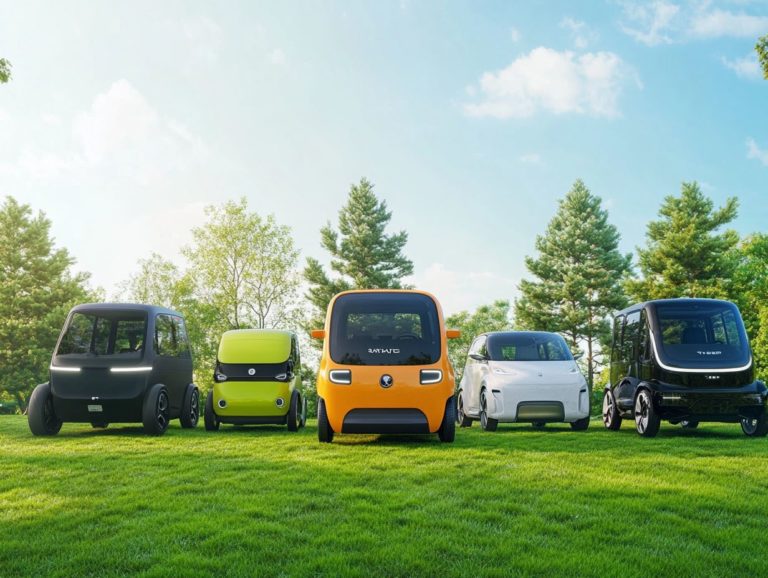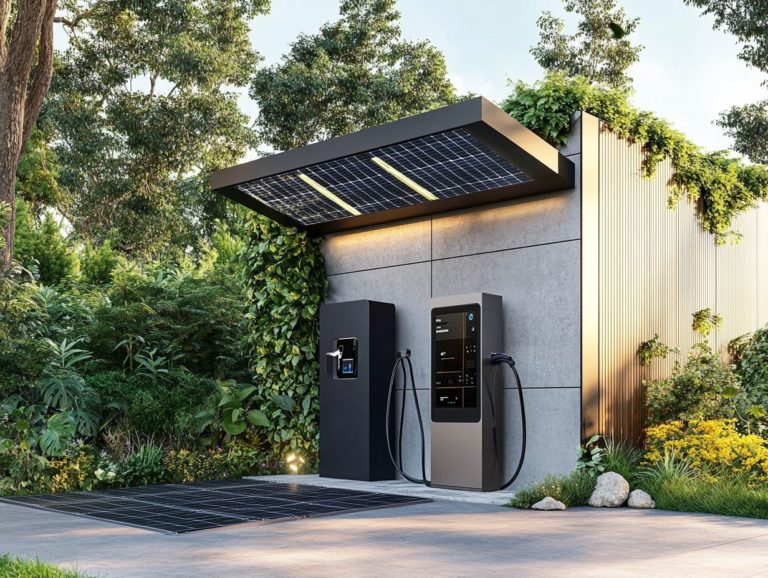How Electric Vehicles Can Help Reduce Waste
As the world confronts the environmental repercussions of traditional gasoline-powered vehicles, electric vehicles (EVs) stand out as a compelling solution.
This exploration delves into the role of EVs in minimizing waste and their potential to revolutionize transportation systems. From cutting down on air and noise pollution to reducing our reliance on fossil fuels, you’ll discover how EVs foster cleaner, more sustainable urban environments.
We ll discuss practical strategies for integrating EVs into waste management initiatives and address the challenges and solutions necessary for widespread adoption.
Join us to unveil how EVs can lead the charge toward a greener future.
Contents
- Key Takeaways:
- The Environmental Impact of Traditional Vehicles
- How EVs Can Help Reduce Waste
- Ways to Incorporate EVs into Waste Reduction Efforts
- Challenges and Solutions for Implementing EVs in Waste Reduction
- Frequently Asked Questions
- How Electric Vehicles Can Help Reduce Waste?
- What Are the Environmental Benefits of Using Electric Vehicles?
- How Do Electric Vehicles Help Reduce Landfill Waste?
- Can Electric Vehicles Be Charged with Renewable Energy Sources?
- Do Electric Vehicles Require Any Special Maintenance?
- Can the Use of Electric Vehicles Help Reduce Waste in the Long Run?
Key Takeaways:
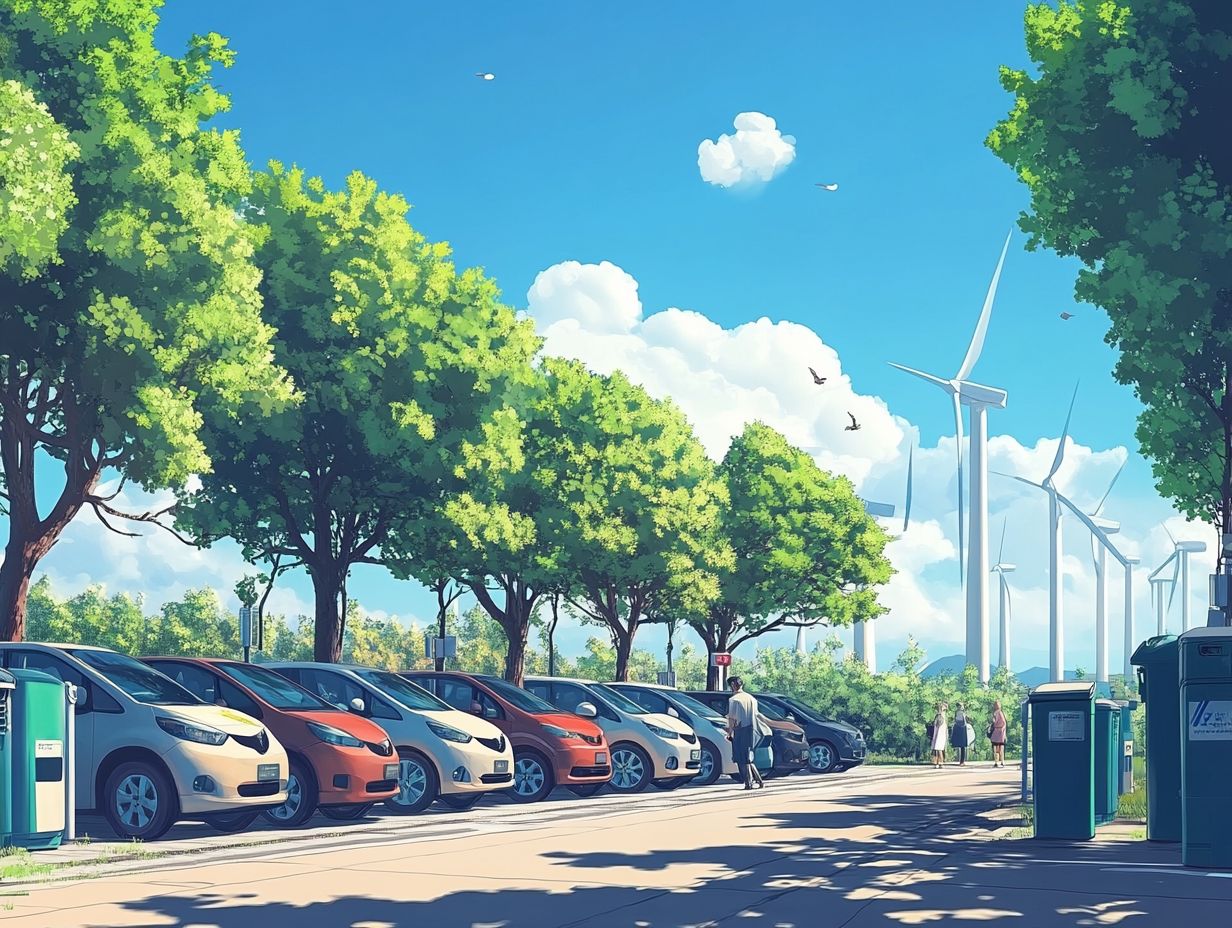
- Electric vehicles significantly reduce air and noise pollution, making them a viable solution for waste reduction and environmental protection.
- Reducing our reliance on fossil fuels allows EVs to help mitigate the negative environmental impacts of traditional gasoline cars.
- Incorporating EVs into waste management efforts can greatly contribute to sustainability and waste reduction.
What are EVs and How do They Work?
Electric vehicles (EVs) provide an eco-friendly alternative to traditional gasoline vehicles. They utilize batteries that store electricity and can be recharged, powered by electric motors for efficient operation. The EV industry has experienced remarkable growth, driven by advancements in vehicle technology and energy storage solutions. This makes EVs a compelling option for reducing greenhouse gas emissions and minimizing carbon footprints in transportation.
The technology behind electric motors is impressive; they convert electrical energy into mechanical energy, enabling smooth acceleration and regenerative braking, a system that helps recharge the battery when slowing down. Battery manufacturing is crucial, as the efficiency and capacity of lithium-ion batteries directly impact the range and performance of these vehicles.
Prominent automotive companies, including Tesla, Ford, and Rivian, are investing heavily in these technologies, revolutionizing the market and showcasing how EVs can significantly contribute to environmental sustainability. By championing energy efficiency and reducing fossil fuel reliance, this transition not only improves air quality but also bolsters the overall health of our planet. Electric vehicles are becoming essential in the fight against climate change.
The Environmental Impact of Traditional Vehicles
Did you know that traditional gasoline vehicles play a substantial role in air pollution and greenhouse gas emissions? They amplify climate change and create a lasting environmental impact on our planet.
These fossil fuel-driven machines emit harmful nitrogen oxides and sulfur oxides into the atmosphere. This not only degrades air quality but also escalates the carbon footprint linked to the transportation sector.
The Negative Effects of Gasoline Cars on the Environment
Gasoline cars are known for their harmful impact on the environment. They significantly contribute to the carbon footprint that accelerates climate change and results in serious air pollution. These vehicles emit a considerable amount of CO2, which deteriorates air quality and poses various health risks, especially for those living near busy roads.
In addition to CO2, these cars release a mix of harmful pollutants, including nitrogen oxides, volatile organic compounds, and particulate matter. These substances can aggravate respiratory issues like asthma and cardiovascular diseases, particularly affecting vulnerable populations such as children and the elderly.
The need for emissions reduction is more crucial than ever. Transitioning to electric vehicles offers a promising solution that can dramatically cut down on toxic emissions. By embracing cleaner alternatives, you can help create healthier communities while actively participating in the fight against climate change, paving the way for a sustainable future.
How EVs Can Help Reduce Waste
Electric vehicles (EVs) present a vital opportunity to reduce waste in the transportation sector, embracing eco-friendly transportation methods that emphasize resource efficiency and the principles of a circular economy.
By choosing to adopt EVs, you can significantly lower your carbon footprint, making strides toward a carbon-neutral future while improving the recycling infrastructure for essential battery materials like lithium and nickel.
Reducing Air and Noise Pollution
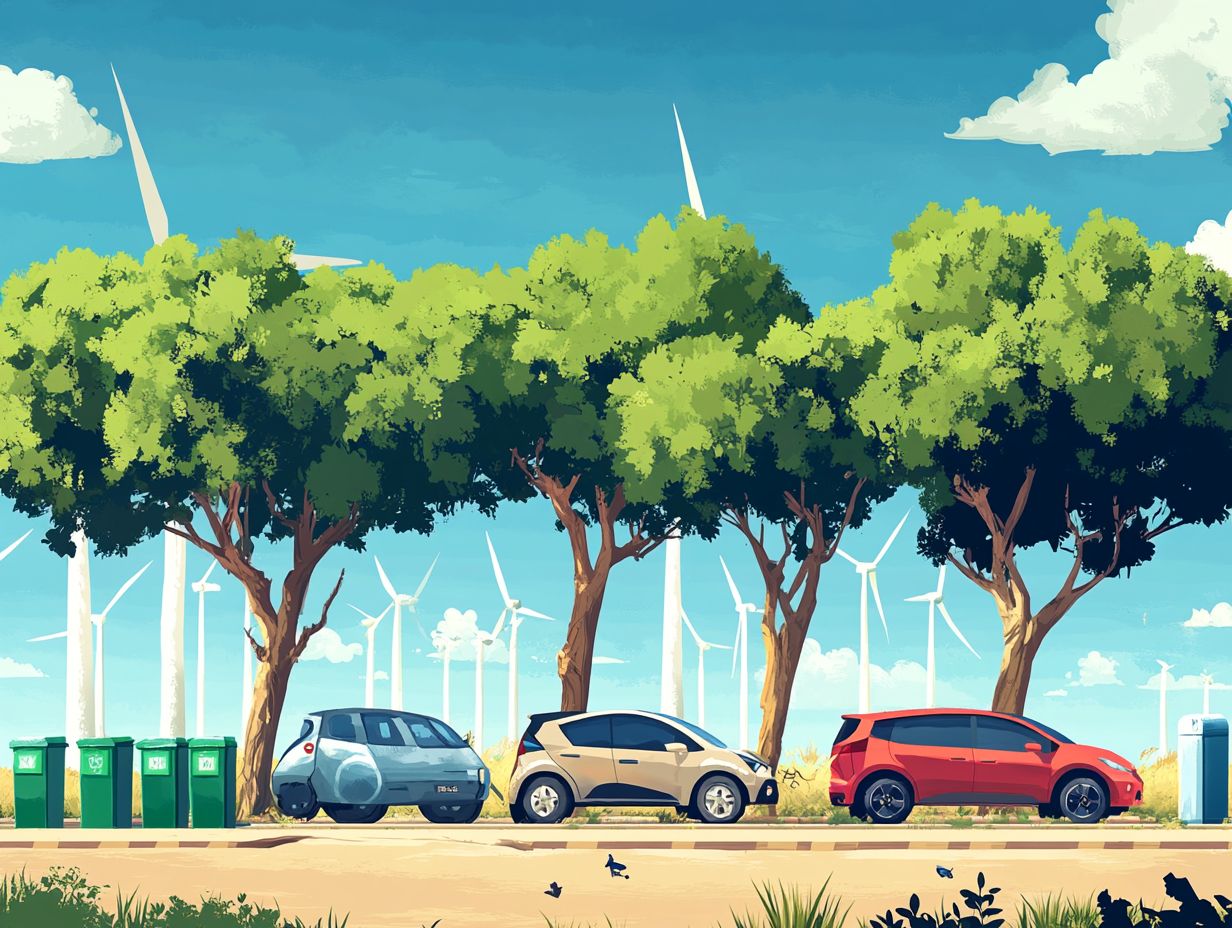
Electric vehicles play a crucial role in cutting air and noise pollution, positively impacting urban environments and public health. By operating quietly and producing zero tailpipe emissions, EVs significantly lower harmful pollutants in the air, leading to cleaner and healthier communities.
Research proves that moving from gasoline vehicles to EVs cuts greenhouse gas emissions by up to 50%, depending on how the electricity is generated. In densely populated areas, this shift results in a noticeable decline in respiratory illnesses and cardiovascular problems linked to poor air quality.
The quieter operation of electric vehicles helps alleviate noise pollution, which has been associated with stress and a decrease in overall well-being. As urban centers increasingly focus on cleaner air and more livable spaces, the widespread adoption of EVs contributes to a healthier atmosphere, ultimately enhancing the quality of life for residents.
Decreasing Dependence on Fossil Fuels
Transitioning to electric vehicles significantly reduces your dependence on fossil fuels, encouraging the adoption of renewable energy sources and aligning with global climate objectives. By investing in EV production and infrastructure, you can diminish reliance on non-renewable resources and pave the way for a sustainable transportation future.
This shift boosts energy independence while creating opportunities to integrate renewable energy, such as solar and wind, into the grid to power these vehicles. As electric cars gain popularity, your demand for clean energy will increase, driving innovations in energy storage and distribution.
Reducing fossil fuel consumption leads to improved air quality and substantial health benefits, positively impacting communities. Embracing electric mobility is a proactive step toward mitigating climate change, offering both environmental and socio-economic advantages that can benefit everyone.
Ways to Incorporate EVs into Waste Reduction Efforts
Incorporating electric vehicles into your waste reduction strategies is crucial for advancing sustainable transportation and enhancing recycling infrastructure. This focus is essential for automotive companies.
By aligning your operations with the principles of a circular economy, you can significantly impact resource efficiency and waste management initiatives, similar to industry leaders like Tesla, Ford, and Rivian.
Using EVs for Waste Collection and Transportation
Implementing electric vehicles in waste collection and transportation can greatly reduce emissions and enhance resource efficiency, offering eco-friendly alternatives to traditional waste management practices. This shift not only boosts the efficiency of waste collection but also minimizes the environmental impact associated with conventional fossil fuel vehicles, highlighting how electric vehicles can influence policy change.
Integrating electric vehicles (EVs) into this sector means lower operating costs since these vehicles typically require less maintenance and rely on more affordable energy sources compared to gasoline-powered ones. Cities like Los Angeles and companies such as Republic Services are already enjoying these benefits, using EVs to cut expenses while actively contributing to cleaner air initiatives.
As you observe these municipalities and corporations transitioning their fleets, it’s clear they set a precedent for more sustainable waste management solutions, demonstrating that environmental responsibility can indeed go hand in hand with economic practicality.
How can you contribute to this positive change in your community? Join the movement toward cleaner transportation today!
Encouraging the Use of EVs in Waste Management Companies
Encouraging waste management companies to embrace electric vehicles is essential. This will promote eco-friendly transport and enhance recycling in the industry.
Integrating EVs into fleets can dramatically cut down on carbon emissions. It also shows a real commitment to environmental sustainability.
To make this transition easier, implement various strategies. Government policies that offer tax breaks or grants for electric waste collection vehicles can be powerful incentives.
Financial tools like low-interest loans or subsidies can motivate fleet upgrades. Public-private partnerships can also help; working together can improve the infrastructure for EVs, including charging stations.
Companies like Waste Management, Inc. are setting the standard. They have ambitious goals to electrify their fleets and lead the way in sustainable waste management practices.
Challenges and Solutions for Implementing EVs in Waste Reduction
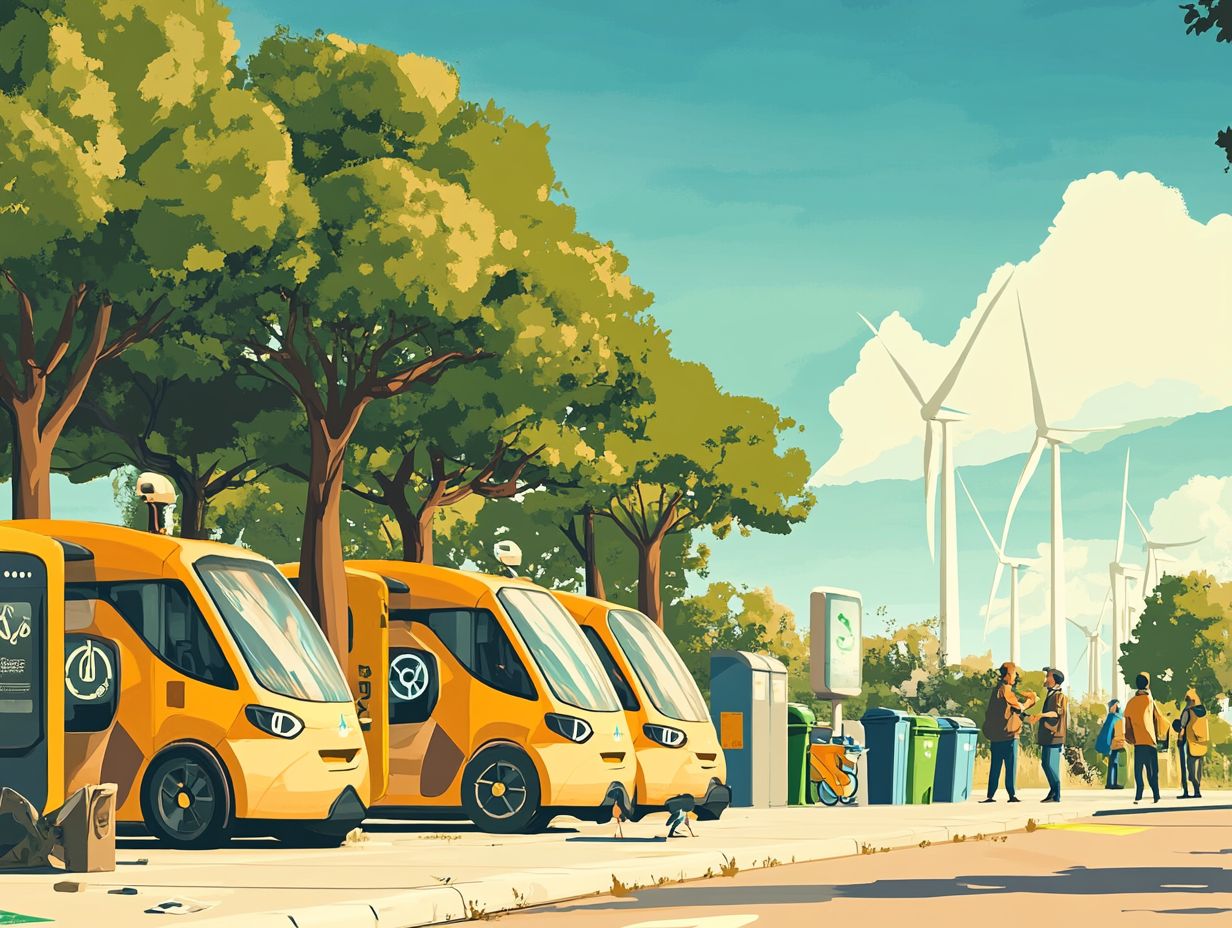
Implementing electric vehicles in waste reduction may have challenges, including infrastructure limitations and cost concerns. However, innovative solutions are emerging to help you navigate this shift, particularly through understanding the role of EVs in reducing carbon emissions.
Addressing these issues can unlock the full potential of EVs to promote sustainable transport and boost recycling efforts.
Addressing Infrastructure and Cost Concerns
It s crucial to tackle infrastructure and cost concerns for the successful adoption of electric vehicles. This involves developing adequate charging stations and minimizing upfront investments.
A well-designed charging network ensures easy access to electric vehicles. Additionally, consider options that provide 24/7 access and regular maintenance to avoid downtime.
Explore financial models like partnerships with charging station providers. These can significantly ease the burden of initial costs.
Government incentives, such as tax credits or grants, can also motivate you to embrace electric waste management. They make sustainability both achievable and financially rewarding!
Government Incentives and Policies to Promote EV Adoption
Government incentives and policies are essential for promoting electric vehicle adoption. These initiatives help accelerate your shift toward sustainable transport and meet climate goals.
In places like California, comprehensive strategies combine financial incentives with strict emissions regulations. Their Clean Vehicle Rebate Project has significantly increased EV registrations, proving how effective tailored support can be.
Continuous investment in charging infrastructure helps eliminate range anxiety. As the landscape evolves, governments should not only maintain these policies but also adapt and innovate to enhance the appeal of electric vehicles.
Frequently Asked Questions
How Electric Vehicles Can Help Reduce Waste?
Electric vehicles help reduce waste by eliminating the need for gasoline and oil. This means no oil changes and less waste overall. They produce zero emissions, reducing air pollution and harmful greenhouse gases. Additionally, how electric vehicles can save natural resources includes the fact that their batteries are recyclable, cutting down on electronic waste.
What Are the Environmental Benefits of Using Electric Vehicles?
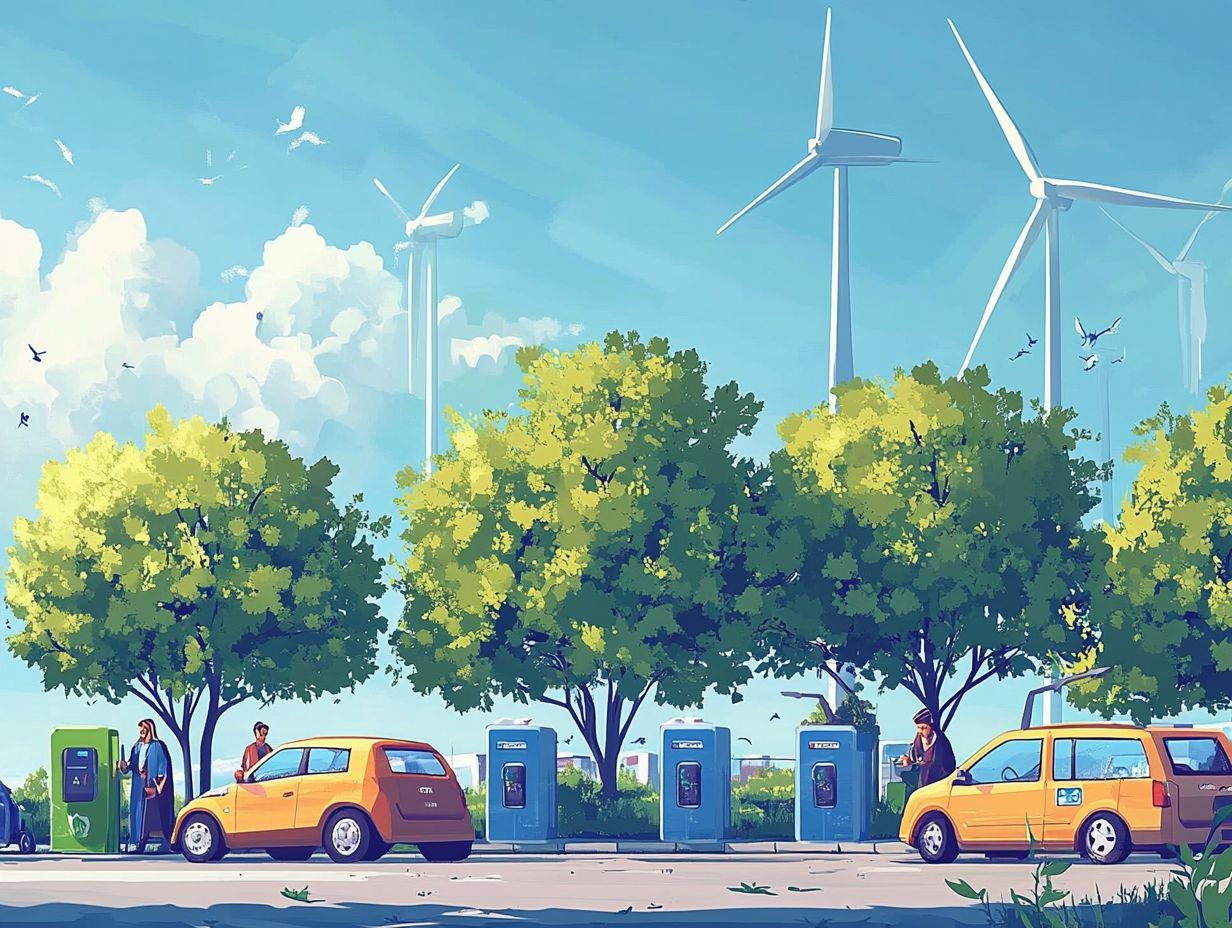
Electric vehicles don t produce emissions, making them a cleaner option for transportation. They also reduce fossil fuel use, which decreases air and water pollution.
Electric vehicles lower noise pollution in cities, creating a quieter environment for everyone.
How Do Electric Vehicles Help Reduce Landfill Waste?
Electric vehicles don’t use traditional fuels like gasoline or diesel, which means less plastic and paper packaging waste. This helps keep more waste out of landfills.
Additionally, the batteries used in electric vehicles can be recycled, further cutting down on electronic waste.
Can Electric Vehicles Be Charged with Renewable Energy Sources?
Absolutely! Electric vehicles can power up using renewable energy like solar and wind, making them even greener. This not only reduces the environmental impact of charging but also encourages the use of clean energy.
Do Electric Vehicles Require Any Special Maintenance?
Electric vehicles require less maintenance compared to traditional vehicles. They don t have engines that need regular tune-ups or oil changes.
However, it’s still vital to follow the manufacturer’s maintenance schedule for the best performance and longevity.
Can the Use of Electric Vehicles Help Reduce Waste in the Long Run?
Yes, using electric vehicles can significantly reduce waste over time. As more people switch to electric, the demand for traditional fuels will drop, leading to less production waste. This shift highlights how electric vehicles can help save the planet.
Advancements in battery technology and recycling processes will make electric vehicles even more sustainable in the future. Join the electric vehicle revolution today to help secure a cleaner, waste-free future!

